The Teachers' Satisfaction Towards Desirable Characteristics of Administrators under Special Education Administration Office in Lopburi Province
DOI:
https://doi.org/10.14456/iarj.2023.140Keywords:
Desirable Characteristics; , Executives of the Office of Special Education AdministrationAbstract
Educational administrators, therefore, have a role and are very important to the operation as a supervisor and initiators of activities of the organization to achieve the goals and lead policies and projects into practice. And is an indicator of the success of the organization. If executives have the appropriate characteristics and abilities, they will receive cooperation from their colleagues. Characteristics and qualities of an organizational leader are therefore very important in achieving objectives. The purposes of this research were 1) to study teachers' satisfaction with the desirable characteristics of administrators, and 2) to compare personal factors to the desired characteristics of executives classified by sex, and work experience. This study was survey research in schools under the Office of Special Education Administration in Lopburi Province. The population for this study was 212 teachers under the Office of Special Education Administration in Lopburi Province in the academic year 2022. The instrument used in this research was the teacher satisfaction questionnaire on the desirable characteristics of administrators. The statistics used in the research were frequency, mean, percentage, standard deviation, F-test, and t-test. The results of the research showed that (1) the overall satisfaction towards the desired characteristics of the executives was at a high level. And (2) the comparative results of teachers of different genders had a statistically significant difference in the level of satisfaction towards the desirable characteristics of administrators in terms of visual and vision aspects at the.05 level. However, the classification by experience was found to be no different.
References
กุลจิรา รักษนคร และสุภัทรศักดิ์ค าสามารถ. (2563). การศึกษากรอบแนวคิดในการพัฒนาทักษะภาวะผู้นำของผู้บริหารสถานศึกษาในศตวรรษที่ 21. วารสารพัฒนาการเรียนรู้ยุคใหม่, 5(2), 274-283.
ชัยยนต์ เพาพาน. (2560). แนวคิดและทฤษฎีพื้นฐานการเป็นผู้นำของผู้บริหารสถานศึกษาใน ศตวรรษที่ 21. วารสารบริหารการศึกษา มหาวิทยาลัยขอนแก่น คณะศึกษาศาสตร์มหาวิทยาลัยขอนแก่น, 12(1), 1-9.
ชุติมา สุทธิวารี. (2560). ความพึงพอใจของครูต่อคุณลักษณะที่พึงประสงค์ของผู้บริหารสถานศึกษาตามความคิดเห็นของครูโรงเรียนในอำเภอแก่งหางแมว สังกัดสำนักงานเขตพื้นที่การศึกษาประถมศึกษาจันทบุรี เขต 1. วิทยานิพนธ์ ศึกษาศาสตรมหาบัณฑิต สาขาวิชาการบริหารการศึกษา มหาวิทยาลัยบูรพา.
เต็มสิริ ทิพย์จันทา. (2553). คุณลักษณะอันพึงประสงค์ของผู้บริหารตามความคิดเห็นของครูผู้สอนในโรงเรียนสังกัดเทศบาลนครภูเก็ต. EAU Heritage Journal, 1(2), 139-147.
บัณฑิต คุณาวุฒิกร. (2561). ความพึงพอใจของครูต่อคุณลักษณะที่พึงประสงค์ของผู้บริหารสถานศึกษา. Journal of Roi Kaensarn Academi, 3(1), 27-40.
บุญชม ศรีสะอาด. (2545). การวิจัยเบื้องต้น. (พิมพ์ครั้งที 7). กรุงเทพฯ: สุวีริยาสาส์น.
บุษบา คํานนท์. (2559). ความพึงพอใจของครูต่อคุณลักษณะที่พึงประสงค์ของผู้บริหาร ในทัศนะของครูโรงเรียนสุรศักดิ์ มนตรีสังกัดสำนักงานเขตพื้นที่การศึกษามัธยมศึกษา เขต 2. วิทยานิพนธ์ ศึกษาศาสตรมหาบัณฑิต, มหาวิทยาลัยบูรพา.
พรทิพย์ สุขเอียด. (2562). ความพึงพอใจของครูต่อคุณลักษณะที่พึงประสงค์ของผู้บริหารตามทัศนะของครู สังกัดสำนักงานเขตพื้นที่การศึกษาประถมศึกษาสงขลา เขต 3. สารนิพนธ์ ศึกษาศาสตรมหาบัณฑิต สาขาวิชาการบริหารการศึกษา. มหาวิทยาลัยหาดใหญ่.
วสันต์ บัวชุม สุรัตน์ ดวงชาทม และระภีพรรณ ร้อยพิลา. (2561). คุณลักษณะอันพึงประสงค์ของผู้บริหารสถานศึกษาตามแนวทางการปฏิรูปการศึกษา ในโรงเรียนประถมศึกษา สังกัดสำนักงานเขตพื้นที่การศึกษาประถมศึกษาบึงกาฬ. วารสารการบริหารการศึกษาและภาวะผู้นำ, 7(27),101-110.
สมบูรณ์ สุริยวงศ์ และคณะ. (2550). วิจัยและสถิติทางการศึกษา. พิมพ์ครั้งที่ 2. กรุงเทพฯ: ศูนย์ส่งเสริมวิชาการ.
Downloads
Published
How to Cite
Issue
Section
License
Copyright (c) 2023 อภิชิต เงินกองแก้ว

This work is licensed under a Creative Commons Attribution-NonCommercial-NoDerivatives 4.0 International License.
Copyright on any article in the Interdisciplinary Academic and Research Journal is retained by the author(s) under the under the Creative Commons Attribution-NonCommercial-NoDerivatives 4.0 International License. Permission to use text, content, images, etc. of publication. Any user to read, download, copy, distribute, print, search, or link to the full texts of articles, crawl them for indexing, pass them as data to software, or use them for any other lawful purpose. But do not use it for commercial use or with the intent to benefit any business.
















.png)


